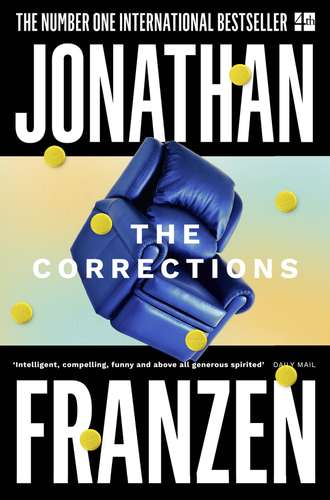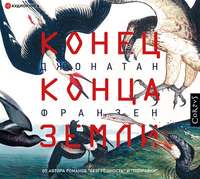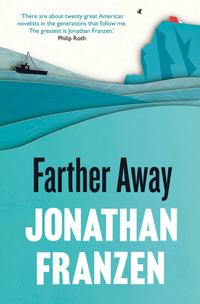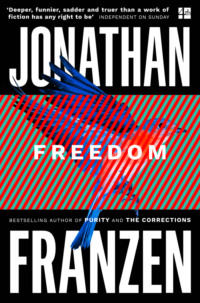
Полная версия
The Corrections
Through his open door Chip could see the door of Vendla O’Fallon’s office. It was papered with healthful images and adages—Betty Friedan in 1965, beaming Guatemalan peasant women, a triumphant female soccer star, a Bass Ale poster of Virginia Woolf, SUBVERT THE DOMINANT PARADIGM—that reminded him, in a dreary way, of his old girlfriend Tori Timmelman. His feeling about decorating doors was: What are we, high-school kids? Are these our bedrooms?
“So basically,” he said, “even though you thought my class was bullshit, it now seems like a superior brand of bullshit because you’re taking hers.”
Melissa blushed. “Basically! Except you’re a much better teacher. I mean, I learned a ton from you. That’s what I wanted to tell you.”
“Consider me told.”
“See, my mom and dad split up in April.” Melissa flung herself down on Chip’s college-issue leather sofa and assumed the full therapeutic position. “For a while it was kind of great that you were being so anti-corporate, and then suddenly it really, really irritated me. Like, my parents have a lot of money, and they’re not evil people, although my dad did just move in with this character named Vicki who’s like four years older than me. But he still loves my mom. I know he does. As soon as I was out of the house, things deteriorated a little, but I know he still loves her.”
“The college has a lot of services,” Chip said, arms folded, “for students going through these things.”
“Thanks. On the whole I’m doing brilliantly, except for having been rude to you in class that time.” Melissa hooked her heels on the arm of the sofa, pried her shoes off, and let them drop to the floor. Soft curves in thermal knitwear spilled out to either side of her overalls’ bib, Chip noticed.
“I had an excellent childhood,” she said. “My parents have always been my best friends. They homeschooled me till seventh grade. My mom was in med school in New Haven and my dad had this punk band, the Nomatics, that was touring, and at my mom’s first ever punk show she went out with my dad and ended up in his hotel room. She quit school, he quit the Nomatics, and they were never apart after that. Totally romantic. See, and my dad had some money from a trust fund, and it was really brilliant what they did then. There were all these new IPOs, and my mom was up on all the biotech and reading JAMA, and Tom—my dad—could vet the numbers part of it, and they just made really great investments. Clair—my mom—stayed home with me and we hung out all day, you know, and I learned my times tables, et cetera, and it was always just the three of us. They were so, so in love. And parties every weekend. And finally it occurred to us, we know everybody, and we’re really good investors, so why not start a mutual fund? Which we did. And it was incredible. It’s still a great fund. It’s called the Westportfolio Biofund Forty? We started some other funds, too, when the climate got more competitive. You kind of have to offer a full array of services. That’s what the institutional investors were telling Tom, at any rate. So he started these other funds, which unfortunately have pretty much tanked. I think that’s the big problem between him and Clair. Because her fund, the Biofund Forty, where she makes the picks, is still doing great. And now she’s heartbroken and depressed. She’s holed up in our house and she never goes out. Meanwhile Tom wants me to meet this Vicki person, who he says is ‘lots of fun’ and a roller blader. The thing is, we all know my mom and dad are made for each other. They complement each other perfectly. And I just think if you knew how cool it is to start a company, and how great it is when the money starts coming in, and how romantic it can be, you wouldn’t be so harsh.”
“Possibly,” Chip said.
“Anyway, I thought you’d be somebody I could talk to. On the whole I’m coping brilliantly, but I could kind of use a friend.”
“How’s Chad?” Chip said.
“A sweet boy. Good for about three weekends.” Melissa swung a leg off the sofa and planted a stockinged foot on Chip’s leg, close to his hip. “It’s hard to imagine two people less long-term compatible than him and me.”
Through his jeans Chip could feel the deliberate flexing of her toes. He was trapped against his desk, and so, to escape, he had to take hold of her ankle and swing her leg back onto the sofa. Her pink feet immediately grasped his wrist and pulled him toward her. It was all very playful, but his door was open, and his lights were on, and his blinds were raised, and somebody was in the hall. “Code,” he said, pulling free. “There’s a code.”
Melissa rolled off the sofa, stood up, and came closer. “It’s a stupid code,” she said. “If you care about somebody.”
Chip retreated to the doorway. Up the hall, by the department office, a tiny blue-uniformed woman with a Toltec face was vacuuming. “There are good reasons to have it,” he said.
“So I can’t even give you a hug now.”
“That’s right.”
“It’s stupid.” Melissa stepped into her shoes and joined Chip in the doorway. She kissed him on the cheek, near his ear. “So there.”
He watched her slide-step and pirouette down the hall and out of sight. He heard a fire door bang shut. He carefully examined every word he’d said, and he gave himself an A for correctness. But when he returned to Tilton Ledge, where the last of the utility lights had burned out, he was swamped by loneliness. To erase the tactile memory of Melissa’s kiss, and her lively warm feet, he phoned an old college friend in New York and made a date for lunch the next day. He took Cent Ans de Cinéma Erotique from the cabinet where, in expectation of a night like this, he’d stashed it after soaking it. The tape was still playable. The image was snowy, though, and during the first really hot bit, a hotel-room scene with a wanton chambermaid, the snow thickened to a blizzard and the screen went blue. The VCR made a dry, thin choking sound. Air, need air, it seemed to say. Tape had leaked out and wound itself around the machine’s endoskeleton. Chip extracted the cassette and several handfuls of Mylar, but then something broke and the machine spat up a plastic spool. Which, all right, these things happened. But the trip to Scotland had been a financial Waterloo, and he couldn’t afford a new VCR.
Nor was New York City, on a cold rainy Saturday, the treat he needed. Every sidewalk in lower Manhattan was dotted with the metallic squared spirals of antitheft badges. The badges were bonded to the wet pavement with the world’s strongest glue, and after Chip had bought some imported cheeses (he did this every time he visited New York to be sure of accomplishing at least one thing before returning to Connecticut, and yet it felt a little sad to buy the same baby Gruyère and Fourme d’Ambert at the same store; it brought him up against the more general failure of consumerism as an approach to human happiness), and after he’d lunched with his college friend (who had recently quit teaching anthropology and hired himself out to Silicon Alley as a “marketing psychologist” and who advised Chip, now, to wake up and do the same), he returned to his car and discovered that each of his plastic-wrapped cheeses was protected by its own antitheft badge and that, indeed, a fragment of antitheft badge had stuck to the bottom of his left shoe.
Tilton Ledge was glazed with ice and very dark. In the mail Chip found an envelope containing a short note from Enid lamenting Alfred’s moral failures (“he sits in that chair all day, every day”) and a lengthy profile of Denise, clipped from Philadelphia magazine, with a slavering review of her restaurant, Mare Scuro, and a full-page glamour photo of the young chef. Denise in the photo was wearing jeans and a tank top and was all muscled shoulders and satiny pecs (“Very young and very good: Lambert in her kitchen,” the caption read), and this was just the kind of girl-as-object horseshit, Chip thought bitterly, that sold magazines. A few years ago Enid’s letters had reliably contained a paragraph of despair about Denise and Denise’s failing marriage, with phrases like he is too OLD for her! double-underlined, and a paragraph festooned with thrilleds and prouds apropos of Chip’s hiring by D—— College, and although he knew that Enid was skilled at playing her children off against each other and that her praise was usually double-edged, he was dismayed that a woman as smart and principled as Denise had used her body for marketing purposes. He threw the clipping in the trash. He opened the Saturday half of the Sunday Times and—yes, he was contradicting himself, yes, he was aware of this—paged through the Magazine in search of ads for lingerie or swimwear to rest his weary eyes on. Finding none, he began to read the Book Review, where a memoir called Daddy’s Girl, by Vendla O’Fallon, was declared “astonishing” and “courageous” and “deeply satisfying” in St. Jude. The name Vendla O’Fallon was rather unusual, but Chip had been so completely unaware that Vendla was publishing a book that he refused to believe she’d written Daddy’s Girl until, near the end of the review, he encountered a sentence that began: “O’Fallon, who teaches at D—— College…”
He closed the Book Review and opened a bottle.
In theory both he and Vendla were in line for tenure in Textual Artifacts, but in practice the department was already overtenured. That Vendla commuted to work from New York (thus flouting the college’s informal requirement that faculty live in town), and that she skipped important meetings and taught every gut she could, had been steady sources of comfort to Chip. He still had the edge in scholarly publications, student evaluations, and support from Jim Leviton; but he found that two glasses of wine had no effect on him.
He was pouring himself his fourth when his telephone rang. It was Jim Leviton’s wife, Jackie. “I just wanted you to know,” Jackie said, “that Jim’s going to be OK.”
“Was something wrong?” Chip said.
“Well, he’s resting fine. We’re over at St. Mary’s.”
“What happened?”
“Chip, I asked him if he thought he could play tennis, and do you know what? He nodded! I said I was going to call you, and he nodded, yes, he was good for tennis. His motor skills appear to be fully normal. Fully—normal. And he’s lucid, that is the important thing. That is the really good news here, Chip. His eyes are bright. He’s the same old Jim.”
“Jackie, did he have a stroke?”
“There’ll be some rehabilitation,” Jackie said. “Obviously today will be his effective retirement date, which, Chip, as far as I’m concerned, is an absolute blessing. We can make some changes now, and in three years—well, it’s not going to take any three years for him to rehabilitate. When all is said and done, we’re going to be ahead of this game. His eyes are so bright, Chip. He’s the same old Jim!”
Chip rested his forehead against his kitchen window and turned his head so that he could open one eye directly against the cold, damp glass. He knew what he was going to do.
“The same old lovable Jim!” Jackie said.
The following Thursday, Chip made dinner for Melissa and had sex with her on his red chaise longue. He’d taken a fancy to the chaise back in the days when dropping eight hundred dollars on an antique-store impulse was somewhat less suicidal financially. The chaise’s backrest was angled in erotic invitation, its padded shoulders thrown back, its spine arching; the plush of its chest and belly looked ready to burst the fabric buttons that crisscrossed it. Breaking his initial clinch with Melissa, Chip excused himself for one second to turn off lights in the kitchen and stop in the bathroom. When he returned to the living room, he found her stretched out on the chaise wearing only the pants half of her plaid polyester leisure suit. In the dim light she could have been a hairless, heavy-titted man. Chip, who much preferred queer theory to queer practice, basically hated the suit and wished she hadn’t worn it. Even after she’d taken off the pants there was a residue of gender confusion on her body, not to mention the rank b.o. that was the bane of synthetic fabrics. But from her underpants, which to his relief were delicate and sheer—distinctly gendered—an affectionate warm rabbit came springing, a kicking wet autonomous warm animal. It was almost more than he could handle. He hadn’t slept two hours in the previous two nights, and he had a head full of wine and a gut full of gas (he couldn’t remember why he’d made a cassoulet for dinner; possibly for no good reason), and he worried that he hadn’t locked the front door—that there was a gap in the blinds somewhere, that one of his neighbors would drop by and try the door and find it unlocked or peer in through the window and see him flagrantly violating Sections I, II, and VI of a code that he himself had helped draft. Altogether for him it was a night of anxiety and effortful concentration, punctuated by little stabs of throttled pleasure, but at least Melissa seemed to find it exciting and romantic. Hour after hour, she wore a big crinkled U of a smile.
It was Chip’s proposal, after a second extremely stressful tryst at Tilton Ledge, that he and Melissa leave campus for the weeklong Thanksgiving break and find a cottage on Cape Cod where they wouldn’t feel observed and judged; and it was Melissa’s proposal, as they departed through D——’s little-used eastern gate under cover of darkness, that they stop in Middletown and buy drugs from a high-school friend of hers at Wesleyan. Chip waited in front of Wesleyan’s impressively weatherproofed Ecology House and drummed on the steering wheel of his Nissan, drummed so hard his fingers throbbed, because it was important not to think about what he was doing. He’d left behind mountains of ungraded papers and exams, and he had not yet managed to visit Jim Leviton in the rehab unit. That Jim had lost his powers of speech and now impotently strained his jaw and lips to form words—that he’d become, according to reports from colleagues who’d visited him, an angry man—made Chip all the more reluctant to visit. He was in the mode now of avoiding anything that might make him experience an emotion. He beat on the steering wheel until his fingers were stiff and burning and Melissa came out of the Ecology House. She brought into the car a smell of woodsmoke and frozen flower beds, the smell of an affair in late autumn. She put into Chip’s palm a golden caplet marked with what appeared to be the old Midland Pacific Railroad logo—without the text. “Take this,” she told him, closing the door.

“This is? Some kind of Ecstasy?”
“No. Mexican A.”
Chip felt culturally anxious. Not long ago, there had been no drugs he hadn’t heard of. “What does it do?”
“Nothing and everything,” she said, swallowing one herself. “You’ll see.”
“How much do I owe you for this?”
“Never mind that.”
For a while the drug did seem, as promised, to do nothing. But on the industrial outskirts of Norwich, still two or three hours from the Cape, he turned down the trip hop that Melissa was playing on his stereo and said, “We have to stop immediately and fuck.”
She laughed. “I guess so.”
“Why don’t I pull over,” he said.
She laughed again. “No, let’s find a room.”
They stopped at a Comfort Inn that had lost its franchise and now called itself the Comfort Valley Lodge. The night clerk was obese and her computer was down. She manually registered Chip with the labored breathing of someone lately stranded by a systems malfunction. Chip put his hand on Melissa’s belly and was about to reach into her pants when it occurred to him that fingering a woman in public was inappropriate and might cause trouble. For similar, purely rational reasons he suppressed the impulse to pull his dick out of his pants and show it to the wheezing, perspiring clerk. But he did think the clerk would be interested in seeing it.
He took Melissa down on the cigarette-divoted carpeting of Room 23 without even shutting the door.
“It is so much better like this!” Melissa said, kicking the door shut. She yanked her pants down and practically wailed with delight, “This is so much better!”
He didn’t dress all weekend. The towel he was wearing when he took delivery of a pizza fell open before the delivery man could turn away. “Hey, love, it’s me,” Melissa said into her cell phone while Chip lay down behind her and went at her. She kept her phone arm free and made supportive filial noises. “Uh-huh … Uh-huh … Sure, sure … No, that’s hard, Mom … No, you’re right, that is hard … Sure … Sure … Uh-huh … Sure … That’s really, really hard,” she said, with a twinkle in her voice, as Chip sought leverage for an extra sweet half inch of penetration while he shot. On Monday and Tuesday he dictated large chunks of a term paper on Carol Gilligan which Melissa was too annoyed with Vendla O’Fallon to write by herself. His near-photographic recall of Gilligan’s arguments, his total mastery of theory, got him so excited that he began to tease Melissa’s hair with his erection. He ran the head of it up and down the keyboard of her computer and applied a gleaming smudge to the liquid-crystal screen. “Darling,” she said, “don’t come on my computer.” He nudged her cheeks and ears and tickled her armpits and finally backed her up against the bathroom door while she bathed him in her cherry-red smile.
Each night around dinnertime, for four nights running, she went to her luggage and got two more golden caplets. Then on Wednesday Chip took her to a cineplex and they sneaked into an extra movie and a half for the price of the original matinee bargain. Back at the Comfort Valley Lodge, after a late pancake dinner, Melissa called her mother and spoke at such length that Chip fell asleep without swallowing a caplet.
He awoke on Thanksgiving in the gray light of his undrugged self. For a while, as he lay listening to the sparse holiday traffic on Route 2, he couldn’t place what was different. Something about the body beside him was making him uneasy. He considered turning and burying his face in Melissa’s back, but it seemed to him she must be sick of him. He could hardly believe she hadn’t minded his attacks on her, all his pushing and pawing and poking. That she didn’t feel like a piece of meat that he’d been using.
In a matter of seconds, like a market inundated by a wave of panic selling, he was plunged into shame and self-consciousness. He couldn’t bear to stay in bed a moment longer. He pulled on his shorts and snagged Melissa’s toiletries kit and locked himself in the bathroom.
His problem consisted of a burning wish not to have done the things he’d done. And his body, its chemistry, had a clear instinctive understanding of what he had to do to make this burning wish go away. He had to swallow another Mexican A.
He searched the toiletries kit exhaustively. He wouldn’t have thought it possible to feel dependent on a drug with no hedonic kick, a drug that on the evening of his fifth and final dose he hadn’t even craved. He uncapped Melissa’s lipsticks and removed twin tampons from their pink plastic holder and probed with a bobby pin down through her jar of skin cleanser. Nothing.
He took the kit back out to the main room, which was fully light now, and whispered Melissa’s name. Receiving no answer, he dropped to his knees and rifled her canvas travel bag. Paddled his fingers in the empty cups of bras. Squeezed her sock balls. Touched the various private pouches and compartments of the bag. This new and different violation of Melissa was sensationally painful to him. In the orange light of his shame he felt as if he were abusing her internal organs. He felt like a surgeon atrociously fondling her youthful lungs, defiling her kidneys, sticking his finger in her perfect, tender pancreas. The sweetness of her little socks, and the thought of the even littler socks of her all too proximate girlhood, and the image of a hopeful bright romantic sophomore packing clothes for a trip with her esteemed professor—each sentimental association added fuel to his shame, each image recalled him to the unfunny raw comedy of what he’d done to her. The jismic grunting butt-oink. The jiggling frantic nut-swing.
By now his shame was boiling so furiously it felt liable to burst things in his brain. Nevertheless, while keeping a close eye on Melissa’s sleeping form, he managed to paw her clothing a second time. Only after he’d resqueezed and rehandled each piece of it did he conclude that the Mexican A was in the big zippered outer pocket of her bag. This zipper he eased open tooth by tooth, clenching his own teeth to survive the noise of it. He’d worked the pocket open just far enough to push his hand through it (and the stress of this latest of his penetrations released fresh gusts of flammable memory; he felt mortified by each of the manual liberties he’d taken with Melissa here in Room 23, by the insatiable lewd avidity of his fingers; he wished he could have left her alone) when the cell phone on the nightstand tinkled and with a groan she came awake.
He snatched his hand from the forbidden place, ran to the bathroom, and took a long shower. By the time he came out, Melissa was dressed and had repacked her bag. She looked utterly uncarnal in the morning light. She was whistling a happy tune.
“Darling, a change of plans,” she said. “My father, who really is a lovely man, is coming out to Westport for the day. I want to go be with them.”
Chip wished he could fail to feel the shame that she was failing to feel; but to beg for another pill was acutely embarrassing. “What about our dinner?” he said.
“I’m sorry. It’s just really important that I be there.”
“So it’s not enough to be on the phone with them for a couple of hours every day.”
“Chip, I’m sorry. But we’re talking about my best friends.”
Chip had never liked the sound of Tom Paquette: a dilettante rocker and trust-fund baby who ditched his family for a roller blader. And in the last few days Clair’s boundless capacity to yak about herself while Melissa listened had turned Chip against her, too.
“Great,” he said. “I’ll take you to Westport.”
Melissa flipped her hair so that it fanned across her back. “Darling? Don’t be mad.”
“If you don’t want to go to the Cape, you don’t want to go to the Cape. I’ll take you to Westport.”
“Good. Are you going to get dressed?”
“It’s just that, Melissa, you know, there’s something a little sick about being so close to your parents.”
She seemed not to have heard him. She went to the mirror and applied mascara. She put on lipstick. Chip stood in the middle of the room with a towel around his waist. He felt warty and egregious. He felt that Melissa was right to be disgusted by him. And yet he wanted to be clear.
“Do you understand what I’m saying?”
“Darling. Chip.” She pressed her painted lips together. “Get dressed.”
“I’m saying, Melissa, that children are not supposed to get along with their parents. Your parents are not supposed to be your best friends. There’s supposed to be some element of rebellion. That’s how you define yourself as a person.”
“Maybe it’s how you define yourself,” she said. “But then you’re not exactly an advertisement for happy adulthood.”
He grinned and bore this.
“I like myself,” she said. “But you don’t seem to like yourself so much.”
“Your parents seem very fond of themselves, too,” he said. “You seem very fond of yourselves as a family.”
He’d never seen Melissa really angry. “I love myself,” she said. “What’s wrong with that?”
He was unable to say what was wrong with it. He was unable to say what was wrong with anything about Melissa—her self-adoring parents, her theatricality and confidence, her infatuation with capitalism, her lack of good friends her own age. The feeling he’d had on the last day of Consuming Narratives, the feeling that he was mistaken about everything, that there was nothing wrong with the world and nothing wrong with being happy in it, that the problem was his and his alone, returned with such force that he had to sit down on the bed.
“What’s our drug situation?”
“We’re out,” Melissa said.
“OK.”
“I got six of them and you’ve had five.”








